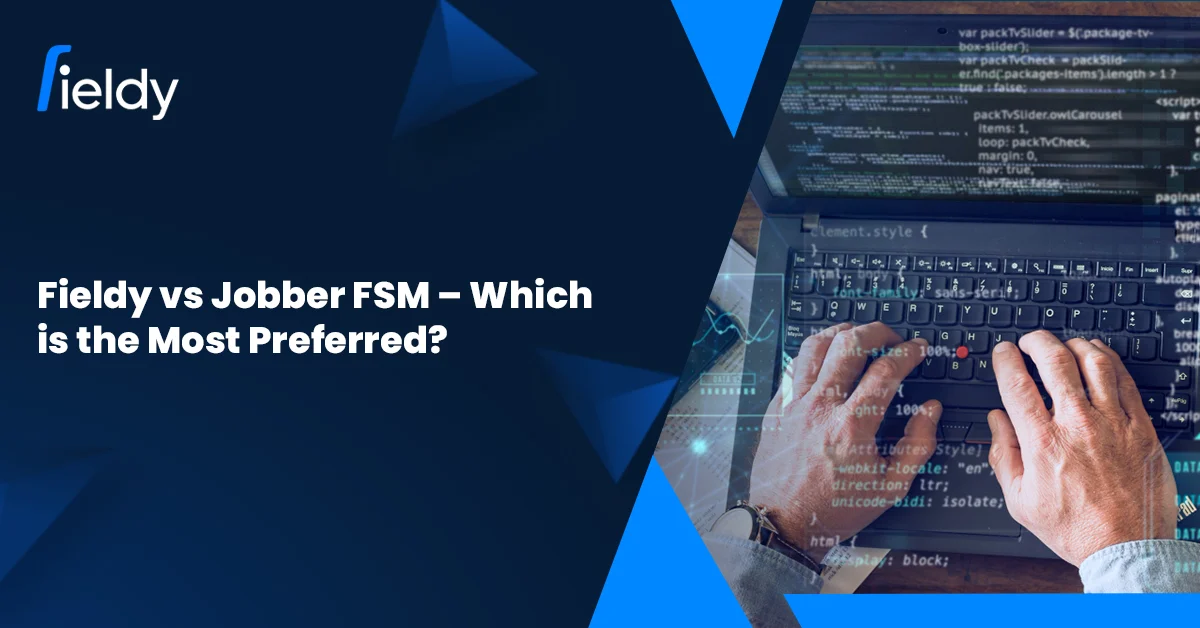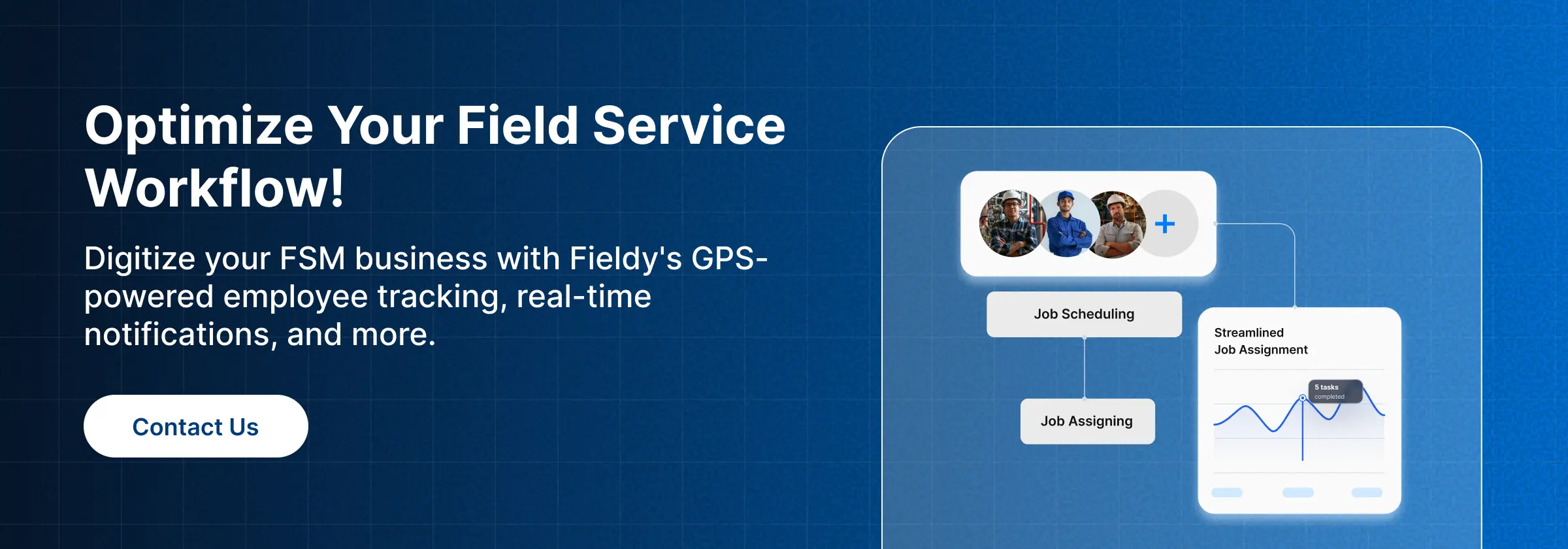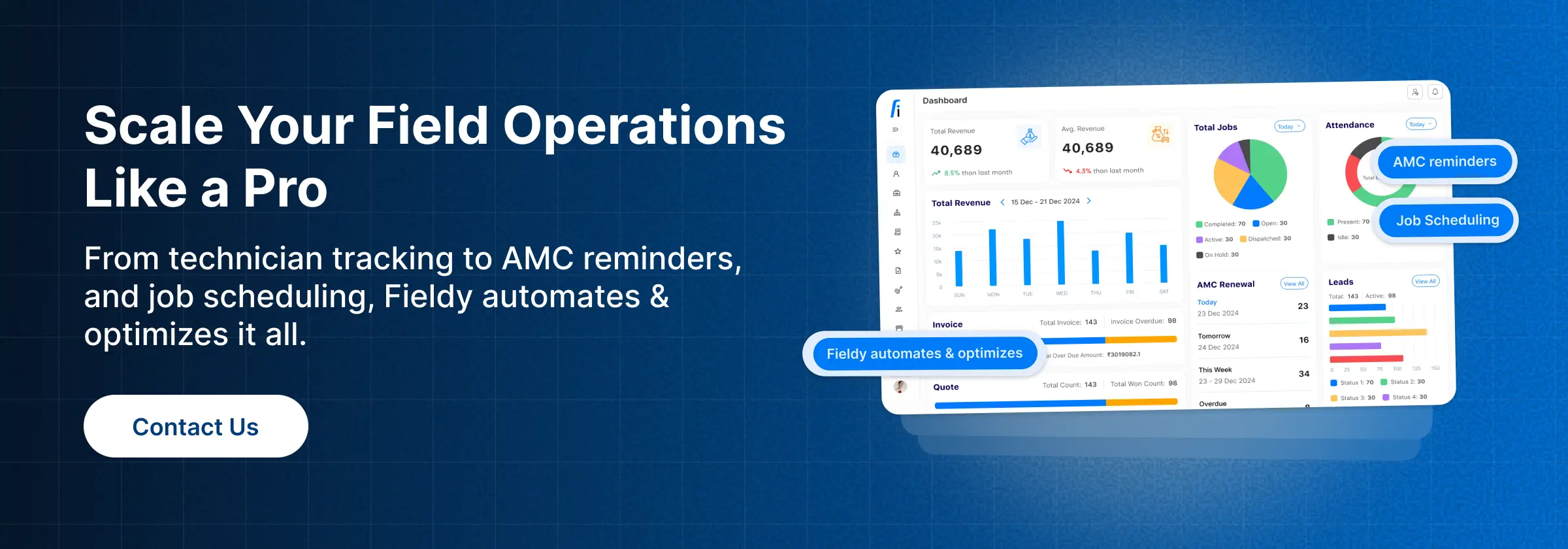✨ Why This Comparison Matters in 2026
In 2026, field service applications have evolved far beyond simple scheduling tools. They’ve become comprehensive operational ecosystems designed to handle everything from real-time technician tracking to contract management. Companies are no longer satisfied with basic admin automation; they want mobile-first solutions that scale effortlessly without heavy infrastructure costs.
Fieldy and Jobber are two leading FSM platforms, but their focus areas differ significantly: Fieldy emphasises real-time operations, franchise support, and cost-effectiveness, while Jobber focuses on invoicing and client-facing workflows.
With the field service management software market approaching the $10 billion mark at a 15% annual growth rate, selecting the right platform can directly impact efficiency and profitability. This comparison breaks down both options to help you determine the preferred choice for 2026’s best field service management software.
📋 Quick Overview of Fieldy and Jobber
📍 What Is Fieldy?
Fieldy is a cloud-based FSM software designed for small and medium-sized service companies or franchises. It offers real-time crew tracking, contract lifecycle automation, and multilingual support, making it ideal for businesses operating across regions.
New in 2026: Automated scheduling, offline mobile capabilities, and 1-day onboarding, enabling teams to cut operational overhead while boosting technician accountability.
🧾 What Is Jobber?
Jobber field service management is a well-recognised FSM platform popular for scheduling, invoicing, and client communications. It suits small businesses with structured workflows and strong client portals.
New in 2026: Jobber introduced upgraded client portals and enhanced accounting integrations, but it still lacks native contract lifecycle management — a feature increasingly vital for recurring services like HVAC and plumbing.
📈 FSM Market Trends in 2026 – Why This Comparison Is Timely
- The FSM software industry is growing 15% year-over-year, projected to exceed $10 billion by 2026.
- Over 70% of service teams are remote, driving demand for mobile-first FSM tools with offline features.
- Automated contract management has become a differentiator for recurring service industries (HVAC, plumbing, IT).
- SMBs and franchises prioritise quick ROI and low setup costs over legacy hardware-heavy solutions (seen in platforms like ServiceTitan field service management software).
🔎 Feature Comparison – Fieldy vs Jobber
| Feature 🔍 | Fieldy 🚀 | Jobber 🛠️ |
|---|---|---|
| 💰 Pricing (per user/month) | ✅ $20–$25 flat | ⚠️ $99+ tiered + onboarding fees |
| 📍 Real-Time Staff Location | ✅ GPS & Live Updates (no hardware) | ⚠️ Vehicle-only tracking |
| 📱 Mobile Experience | ✅ Intuitive, fast, offline mode | ⚠️ Heavier app, learning curve |
| 📅 Dispatch & Scheduling | ✅ Drag-and-drop with field view | ✅ Strong, but complex |
| 📑 Contract Renewal Automation | ✅ Fully automated | ⚠️ Manual triggers |
| 📂 Industry-Specific Templates | ✅ HVAC, plumbing, solar built-in, etc. | ⚠️ Limited templates |
| ⚡ Setup Time | ✅ 1-day setup | ⏳ Weeks of onboarding |
| 🖥️ Hardware Investment | ✅ No hardware needed | ❌ Requires telematics hardware |
| 🌍 Franchise Access | ✅ Multi-location dashboard | ⚠️ Needs custom setup |
| 🤝 Support & Onboarding | ✅ Free and fast | ⚠️ Premium/charged |
🚀 Where Fieldy Outperforms Jobber
📡 Built for Real-Time Operations, Not Just Admin Work
Unlike Jobber, which primarily focuses on administrative workflows like quoting and invoicing, Fieldy’s Field Service Management Software offers crew-level live tracking without additional hardware. It also offers employee GPS tracking app where technicians can be tracked in real time using only their mobile devices, a critical advantage for fast-moving field teams. Competing platforms such as ServiceTitan field service management software offer similar tracking but often require telematics hardware, making them less cost-effective for SMBs.
📱 Faster, Lighter Mobile App for Field Crews
Fieldy’s lightweight mobile app supports offline mode, ensuring technicians stay productive even in low-network areas. Jobber’s app, though functional, is heavier and better suited for admin staff rather than field crews. In comparison, some enterprise tools like the ServiceTitan field mobile app provide deep reporting but have a steeper learning curve for technicians. For more details, check the detailed comparison of Fieldy vs ServiceTitan.
⚡ Setup Simplicity & Cost-Effective Scalability
Fieldy delivers plug-and-play setup in just one day, eliminating the need for third-party onboarding. Jobber requires tiered onboarding packages and can take weeks to fully implement.
🎯 Why Fieldy Works Better for SMBs, Franchises, and Agile Teams
🏬 Fieldy for Franchises and Multi-Location Businesses
Fieldy’s central dashboard lets franchise owners manage multiple locations with role-based access control. This makes it particularly effective for scaling operations across cities or countries and is a key reason it is consistently ranked among the Top FSM Software in India & US for multi-branch service businesses.
🌍 Flexibility for India + US Markets
Fieldy supports multi-currency billing, multilingual interfaces, and regional compliance, making it ideal for Indian and global franchises. In contrast, Jobber is primarily North America–focused, limiting flexibility for international expansion.
🛠️ Use Case – HVAC Business with 50+ Technicians
✅ With Fieldy: Real-Time Tracking Without Hardware
Managers gain real-time visibility of technicians using live GPS field staff tracking app on their mobile devices, no extra hardware required. This enables faster dispatch, automated contract renewals, and quicker quote conversions, making it ideal for high-volume operations like HVAC, plumbing, or solar service companies. Its simplicity also means even franchises with multiple branches can onboard teams in a single day.
✅ With Jobber: Strong Invoicing, Limited Operational Insight
Jobber field service management software is well-regarded for its invoicing and customer communication features, which suit smaller service businesses prioritising billing workflows. However, it lacks crew-level real-time tracking and multi-location dashboards, limiting its value for teams managing large, dispersed field operations that require deeper operational visibility.
🔗 Integration and Ecosystem
| Platform ⚖️ | Integrations 🔌 |
|---|---|
| Fieldy 🚀 | 🤝 Integrates with Zoho and Salesforce.
📲 Supports WhatsApp notifications for customer engagement. 📑 Works with CLM tools for smooth operations and contract management. |
| Jobber 🛠️ | 💵 Focused on accounting integrations like QuickBooks.
⚡ Supports Zapier for workflow automation. 💳 Integrates with Stripe, ideal for finance-driven workflows. |
💵 Pricing Comparison – Which Offers Better Value?
| Platform ⚖️ | Pricing Details 💡 |
|---|---|
| Fieldy 🚀 | 💵 Flat-rate pricing of $20–$25 per user/month with no onboarding fees.
📊 Predictable costs ideal for SMBs and franchises scaling rapidly. 🌍 Ensures affordability during multi-location expansion. |
| Jobber 🛠️ | 💸 Tiered pricing starts at $99+ per user/month, often with additional onboarding fees.
👥 Works well for small, steady teams. ⚠️ Costs can strain budgets when scaling across regions or unlocking advanced features. |
Result: Fieldy offers better value for scalability and real-time operations.
⭐ Customer Reviews & Popularity
| Platform ⚖️ | Reviews & Popularity 💬 |
|---|---|
| Fieldy 🚀 | ⭐ 4.7/5 on G2 and Capterra.
🙌 Praised for ease of use, live real-time tracking, and quick onboarding. 💰 Flat pricing + 🌍 multi-location dashboard valued by fast-scaling SMBs and franchises. |
| Jobber 🛠️ | ⭐ 4.5/5 rating.
🧾 Known for invoicing and client portals. ⚠️ Some users cite heavier mobile app and 💸 higher pricing as drawbacks. |
Trend: Fieldy is rapidly growing in industries like HVAC, plumbing, and solar, while Jobber remains popular with established small businesses focused on client billing.
⚖️ Pros and Cons of Each Platform
Fieldy 🚀
| ✅ Pros | ❌ Cons |
|---|---|
| 💰 Affordable | 🌱 Newer market presence |
| 📍 Real-time live crew tracking | |
| 🌍 Franchise-ready | |
| ⚡ Quick setup |
Jobber 🛠️
| ✅ Pros | ❌ Cons |
|---|---|
| 🧾 Excellent invoicing | 💸 Higher cost |
| 🏆 Established brand | 📱 Heavier mobile app |
| 🤝 Strong client-facing features | 📑 Lacks native contract automation |
📋 Buyer’s Checklist – How to Choose Between Fieldy and Jobber
- Budget: Fieldy’s flat $20–$25 pricing is predictable and easy to scale, while Jobber field service management software uses tiered pricing ($99+), which can rise quickly as teams grow.
- Operational Needs: Fieldy is ideal for real-time live tracking and contract automation, while Jobber focuses on invoicing and client portals.
- Scalability: Fieldy supports multi-location and franchise operations; Jobber suits single-location businesses.
- Integration: Fieldy connects with CRMs like Zoho and Salesforce; Jobber works best with accounting tools like QuickBooks and Stripe.
- Setup Speed: Fieldy can be onboarded in a single day, whereas Jobber often requires multi-week setup.
🏆 Final Verdict – Which FSM Tool Should You Choose?
For 2026, Fieldy’s FSM software emerges as the most preferred for businesses prioritising real-time operations, cost efficiency, and franchise scalability. Its lightweight mobile app, quick onboarding, and predictable pricing make it ideal for SMBs and franchises seeking fast ROI.
Jobber remains a solid option for companies focused on invoicing and client portals, but lacks the operational depth needed by modern field teams.
If you’re ready to streamline operations, track crews in real-time, and scale without extra hardware, Fieldy is the clear choice for 2026. Start with Fieldy today and experience the impact from day one.
❓ FAQs
Is Fieldy better for real-time tracking?
A: Yes. Fieldy provides crew-level live GPS tracking without extra hardware, enabling managers to optimise dispatch in real time. Jobber focuses more on admin tasks than continuous tracking.
Which is more affordable for SMBs in 2025?
A: Fieldy’s flat pricing ($20–$25 per user/month) is more budget-friendly than Jobber’s tiered $99+ plans with onboarding fees, making it ideal for scaling teams.
Do they integrate with CRM and accounting solutions?
A: Yes. Fieldy integrates with Zoho, Salesforce, and WhatsApp, while Jobber integrates with QuickBooks, Zapier, and Stripe — catering to different priorities (CRM vs finance).
Which is better for franchises or multi-location businesses?
A: Fieldy’s multi-location dashboard and role-based access make it ideal for franchises, whereas Jobber suits single-location businesses focused on invoicing.
Which mobile app performs better in the field?
A: Fieldy’s lightweight mobile app works offline and is optimised for technicians. Jobber’s app is feature-rich for admin use but heavier in the field.




